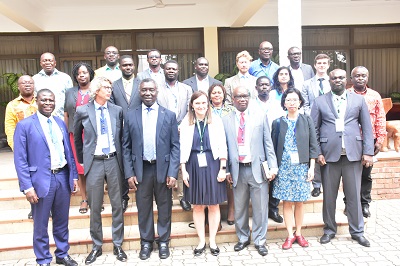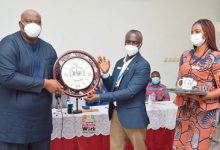
A two-day meeting aimed at proposing joint actions to address marine litter and promote sound management of micro plastics has ended in Accra.
It was organised by the Ministry of Environment, Science, Technology and Innovation (MESTI) in partnership with the United Nations (UN) Environment and the Secretariats of Basel, Rotterdam and Stockholm (BRS) Conventions.
The event brought together government officials, private sector, civil society organisations and the secretariats to discuss plastic waste management project objectives, expected outcomes, modality, feedback and the way forward.
Opening the meeting on Tuesday, Professor Kwabena Frimpong-Boateng, Sector Minister, stated that about 10 per cent of the 3,000 tonnes of plastic waste generated in the country daily ends in the sea.
This, he said, threatens the food safety and quality, human health, coastal tourism and contributes to climate change.
In response, the national plastics management policy, which was currently being developed, he said, was designed to comprehensively manage plastics to address current environmental challenges while using it as a vehicle for sustainable development.
He explained that it would propel the creation of a vibrant recycling industry, lead to job creation and socio-economic development and protect the environment including mitigation of climate change.
The policy and standards being developed, he said, would guide the transition towards a circular plastics economy and protect vulnerable individuals and communities from harmful effects of mismanaged plastic waste.
Peter Derry, acting Director of Environment, MESTI, noted that the policy was hinged on four thematic areas including behaviour change, strategic planning and cross-sectional collaboration, innovative resource mobilisation and good governance and accountability.
In addition to the policy, he said, the ministry was also developing its implementation plan and concept for the establishment of a Resource Recovery Secretariat to coordinate activities aimed at addressing plastic waste management.
He said the secretariat would bring together academia, private sector and the government to work together on projects purposely designed to tap the economic benefits of plastic waste.
Contrary to some reports that government would not ban plastics, he said, the national policy on plastic provides for ban on plastics which were hazardous and plastics with alternatives.
As part of efforts to address marine litter through coordinated programmes and activities by the global ommunity, Counsellor of the Norwegian Embassy in Ghana, Stein Nevsag, said Norway has provided funding to the BRS Convention Secretariat to be able to support programmes aimed at combating marine litter.
He called on Ghana to support global agreement to tackle marine plastic litter and micro plastic.
BY CLAUDE NYARKO ADAMS







